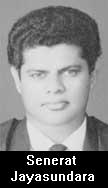 |
Hulftsdorp Hill28th March 1999 Kissing went by favour, bail by seniorityBy Mudliyar |
Front Page | |
|
The submissions they make, they allege, on the same matter are given a different treatment to the preferential treatment given to the seniors. After the introduction of the Administration of Justice Law with the introduction of Sinhala, this position changed slightly in the original Courts. Before that it was well known that some Magistrates rejected a motion filed by a junior lawyer seeking an accused to be released on bail in the morning, and in the evening the same application on the same facts, an order releasing the suspect on bail was made. Kissing went by favour, bail went by seniority, was the adage. But most Judges would say the reason for this was the incompetence of the junior lawyer who was more keen on making money in the quickest possible time, and had no interest in earning and expanding his knowledge of the law, which is the preserve of the astute senior.. The juniors always had a rough time in trying to make their grade. They felt that most Judges felt that their submissions lacked the touch of the classical mould of the senior. This background is essential to understand the importance of the interpretation of the Bail Act as found in the original which is printed in Sinhala. Mr. Senerath Jayasundara is relatively junior in the profession. He has completed nine years at the Bar. He studied at St. Anne's College, Kurunegala and therefore did not have relations in the 'Mustangs' Tent. But as a student of law he was able to see what the Legislature intended in enacting the Bail Act. He was highly appreciative of his mentor Professor G.L. Pieris with whom he had a close association. He would have been moved by the exhortation of Professor Pieris when he said in Parliament in his inevitable style about human freedom and the Rule of the Law. "Human freedom, Mr. Speaker, is one of the core values of the law. Here we have a situation where people are deprived of their freedom not because they have committed any criminal offence, but simply because of poverty. That state of things strikes at the very root of the foundations of any system of civilized and humane law; it needs to be rectified as a matter of priority. That is why I would suggest in all humility, that it is now exceedingly appropriate for Parliament to step in to remove all doubts with regard to this matter and to state loudly and clearly in a manner that does not admit any ambiguity what the rule is and what the exception is. "The rule is grant of bail. "The rule therefore upholds the values anchored in human freedom".. The poetic words which emanate from Mr. Senerath Jayasundera's mentor and guru Professor G.L. Pieris would have reverberated a thousand times in his ears. Words like 'core values of the law' and 'foundation of any system of humane law' would have persuaded him to achieve these super human goals in a society where everything is done to snuff out any freedom and to deprive people of civilized and humane law.. The new Bail Act epitomizes these civilized principles, dear to the heart of a person who throughout his career has been a teacher with tender and loving care. Mr. Jayasundara when he proceeded to the Negombo High Court had an uphill task of obtaining bail for a client who had been arrested for possessing a large quantity of heroin. The suspect had been in remand for more than two years. The very fact that the suspect was charged for possessing heroin was sufficient to deter many a Judge to release such suspects on bail. Unfortunately the juniors in the profession had to be satisfied with this sort of application which is usually not undertaken by senior lawyers as the chances of succeeding in such an application is remote. As Mr. Jayasundara proceeded to Negombo High Court the words of Professor G.L. Pieris came back to his mind. "The Bail Act was enacted to remove all doubts with regard to bail and was introduced in a manner that does not admit any ambiguity what the rule is and what the exception was". It was at this stage Mr. Jayasundara looked at the Sinhala Act called
the 'Epa Panatha' and read Section 3 of the Act and found it materially
different to Section 3 of the English Act and Section 28 of the Act very
clearly states that if there is a discrepancy between the Sinhala and the
Tamil text the Sinhala text will prevail. In fact there is no mention of the English Act. Strangely Section 3 of the Bail Act printed in English states "nothing in this Act shall apply to any person accused or suspected of having committed or convicted an offence under the Prevention of Terrorism (Temporary Provisions) Act No. 48 of 1979, Regulations made under the Public Security Ordinance or any other written law" which makes express provisions in respect of the release on bail of persons accused or suspected of having committed offences under such other written law.. It was the contention of Mr. Jayasundara, that if one studies very carefully and analyses the thinking of Professor G.L. Pieris when he introduced the Bail Act in Parliament that it is very clear that Professor G.L. Pieris never intended that other subsidiary legislation made on an ad-hoc basic for the purpose of appeasing human emotion and public outcry at a time when such legislation was introduced should prevail upon the provisions of the Bail Act in any appreciable offence other than in the cases of suspects being detained under the Prevention of Terrorism (Temporary Provisions) Act or under Emergency Regulations there were provisions for a Judge to keep in custody a suspect for a period of 12 months and then if necessary to extend it by another year. It was expected that a person should not be kept in remand for more than one year. Therefore in legislation like Poison, Opium and Dangerous Drugs or the Offensive Weapons Act, a person could be technically incarcerated for two years. It was therefore not necessary to file applications under various Acts to various forums including that of the Court of Appeal to obtain the release of suspects on bail. If bail was the bread of the junior lawyer, the butter to be applied on the bread came from the Bail Act. Therefore the Sinhala Act in the original has clearly and unambiguously made every other offence other than the PTA and Emergency Regulations covered by the Bail Act, but not under any other written law. Mr. Jayasundara was able in his own style to convince the Negombo High Court that the interpretation of the words 'any other written law' to the words 'that written law' which are the words found in the Sinhala Act. Mr. Gamini A.L. Abeyratne is a Judge who studied at St. Thomas' College, Mt. Lavinia and is more fluent in Sinhala than even the lawyers who had studied and graduated mainly in Sinhala. Mr. Gamini Abeyratne in his judgement states a very important mistake most legislators do. They think in English and then strive to put the English thinking into Sinhala. He says "if one, whether lawyer, Judge or any other person would think in English and would try to import the syntax and rules of grammar and strive to understand the meaning of Section 3 of the Bail Act, I without any hesitation state that he will not be in a position to understand fully the meaning of the said Section". . This is an admonition given to young lawyers who wish to succeed in their profession: "To succeed in the profession of the law, you must seek to cultivate command of language. Words are the lawyer's tools of trade. When you are called upon to address a Judge, it is your words which count most. It is by them that you will hope to persuade the Judge of the rightness of your cause. When you have to interpret a section in a Statute or a paragraph in a Regulation, you have to study the very words. You have to discover the meaning by analysing the words – one by one – to the very last syllable. When you have to draw up a will or a contract, you have to choose your words well. You have to look into the future – envisage all the contingencies that may come to pass – and then use words to provide for them. "On the words you use, your client's future may depend. The reason why words are so important is because words are the vehicle of thought. When you are working out a problem on your own – at your desk or walking home – you think in words, not in symbols or numbers. When you are advising your client – in writing or by word of mouth – you must use words. "There is no other means available. To do it convincingly, do it simply and clearly. If others find it difficult to understand you, it will often be because you have not cleared your own mind upon it."
|
||

|
Please send your comments and suggestions on this web site to |
|
 Junior
lawyers often lament that the Judges do not give them a fair hearing, and
thus they become disadvantageous in the eyes of the litigants, not due
to their lack of knowledge of the law, but due to the lack of seniority
in the profession.
Junior
lawyers often lament that the Judges do not give them a fair hearing, and
thus they become disadvantageous in the eyes of the litigants, not due
to their lack of knowledge of the law, but due to the lack of seniority
in the profession.
